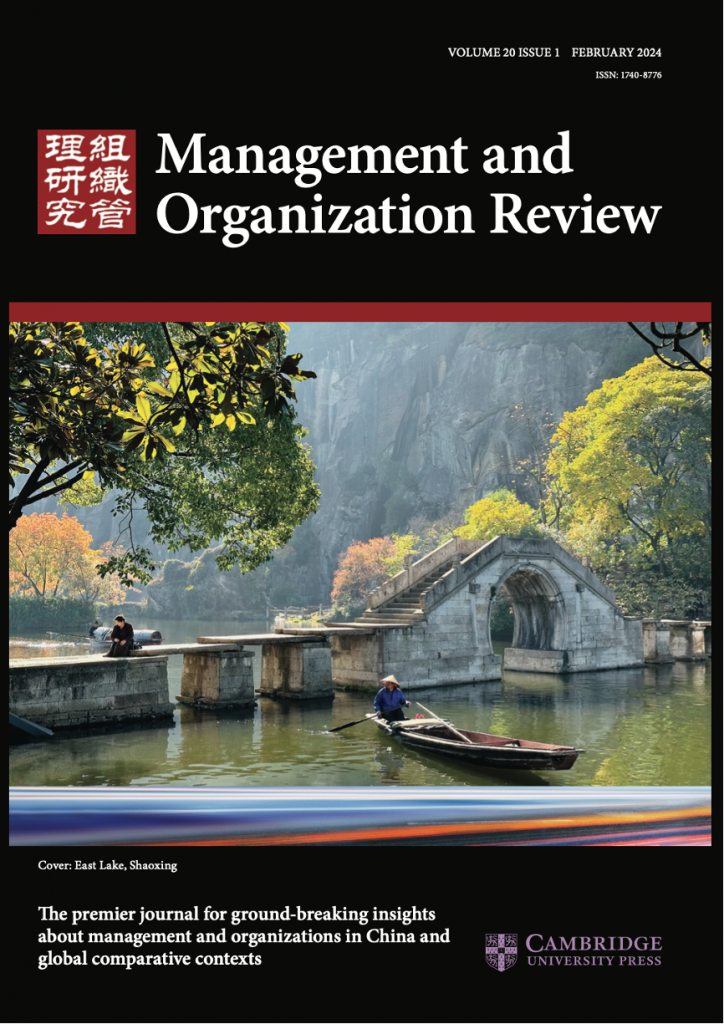主编来信|《组织管理研究》20.1

Letter from the Editor
Dear colleagues,
It is with great excitement that I present this new issue of MOR to you. In responding to the responsible research in business and management (RRBM) movement, more and more management scholars conduct studies to identify responsible behaviors at the organizational and individual levels, in advanced and emerging markets. The collection of articles published in this issue provides a glimpse of this effort, starting with a paper reviewing the literature (173 journal articles) on corporate social irresponsibility in business, pointing out its antecedents and consequences, as well as the moderating factors that can reduce it. More importantly, this paper identified a promising future agenda to advance this stream of research (Tan, Wu, & Zhong, 2024).
Following that, Qu, Fu, Tu, and Shadnam (2024) study responsible leadership using a case approach in which in-depth interviews were conducted among 9 highly regarded Chinese business executives and 92 stakeholders with whom they were familiar. It is revealed that in China, it is the leaders’ moral character that guides them to define and take responsibility for themselves, their employees, companies, and external stakeholders. The authors call it ‘responsible leadership with Chinese characteristics’, emphasizing the moral traditions of the Chinese culture in defining responsibility.
Connecting responsible behavior with dissent voting by board directors, Zhang, Liu, and Zhong (2024) focus on directors’ board interlocking network centrality, which can supplement their existing information set and facilitate reputation spillover, to study their dissent on boards. The authors found supporting evidence for a positive relationship between network centrality and dissent voting, and such relationship was weaker when firm transparency was higher, and/or there was more media mention of a director, demonstrating information and reputation mechanisms, respectively. Furthermore, as green innovation represents a responsible behavior that helps emerging market firms obtain regulatory and social legitimacy in host countries, it positively predicts their export performance. Using a panel dataset populated by 254 Chinese listed manufacturing companies from 2011 through 2017, Shu, Zhao, Yao, and Zhou (2024) showed that relationship.
To stretch a little, CEOs’ international experience in advanced market economies may be viewed as a responsible behavior, because it helps them overcome managerial myopia and facilitate their firms’ investment horizons in a transitioning economy. Ge, Muller, Gong, and Qian’s (2024) study of a matched sample of 204 Chinese CEOs during the period 2002–2019 revealed that was indeed the case. Moreover, while we all know that mask wearing is an individual responsible behavior during the COVID-19 pandemic, Bai, Liu, and Guo (2024) found that mask wearing also enabled workers to adopt more authentic emotional displays, which in turn decreased their emotional exhaustion. Furthermore, such effect was stronger for those with more frequent face-to-face interaction.
I am hopeful that more responsible behaviors and practices in organizations will be identified in 2024, the dawn of a new era when more advanced technology and artificial intelligence start to permeate the workplace. I thank every author, reader, reviewer, and editor for your support of MOR!
With gratitude,

Xiao-Ping Chen
Editor-in-Chief, Management and Organization Review
Table of Contents
Xiaoxia Tan, Xiaojie Wu, and Xi Zhong
Corporate Social Irresponsibility in Business: A Systematic Literature Review and Future Agenda
Qing Qu, Pingping Fu, Yu Tu, and Masoud Shadnam
Responsible Leadership with Chinese Characteristics
Hong Zhang, Zimin Liu, and Weiguo Zhong
Network Centrality and Dissent Voting by Directors on Boards
Chengli Shu, Jingxu Zhao, Qiong Yao, and Kevin Zheng Zhou
Green Innovation and Export Performance in Emerging Market Firms: A Legitimacy-based View
Lipeng Gary Ge, Alan Muller, Tianyu Gong, Cuili Qian
CEO International Experience in Advanced Market Economies and Firm Investment Horizon in a Transitioning Economy
Yang Bai, Wenxing Liu, and Li Guo
Working with a Mask: How and When Workplace Mask Wearing Decreases Employee Emotional Exhaustion
————————————————————————————————————–
Please note that full articles of MOR are accessible by paid members by logging into Dedicated Membership Area.
If you are not a paid member yet or your membership has expired, you are strongly encouraged to make the payment and enjoy membership benefits at the rate of USD 50 for student members and USD100 for regular members. Please click here for details.
